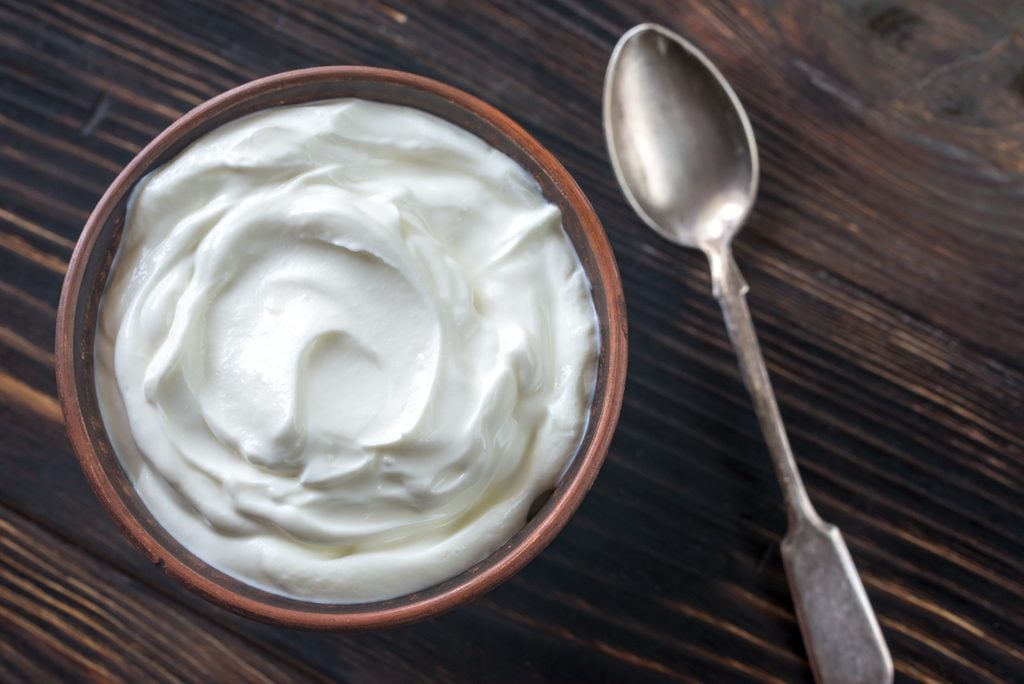If You Don’t Eat Yogurt Every Day, This Might Convince You to Start
Updated: Nov. 04, 2022

Here's another reason to add yogurt to your diet!
Lung cancer is the leading cause of cancer death in America. And although smoking is an obvious culprit, up to 20 percent of people with lung cancer have never touched a cigarette, according to Brian Mitzman, MD, a thoracic surgeon and Assistant Professor of Clinical Surgery at the University of Utah. People who already avoid smoking and still have a high risk of developing lung cancer may want to stop and shop in the dairy section. According to a new study, there’s a link between a high intake of yogurt and fiber, and a reduced risk of lung cancer. There’s another food you should be eating daily according to science: bananas.
What the study says
Researchers published a report in JAMA Oncology based on an analysis of ten studies from the United States, Europe, and Asia, involving a total of about 1.4 million people. They examined 18,822 cases of lung cancer and adjusted for lung cancer risk factors, like smoking. “This study is an ‘observational trial’ in which researchers look back to see if there’s an association between a disease and other factors after the fact,” Dr. Mitzman explains. “The results of observational trials are not as accurate as randomized or blinded studies, but can still give us important information,” he says.
With that in mind, the study suggests that eating yogurt and fiber is linked to a reduction in lung cancer risk. They found that men who ate about three ounces of yogurt a day, and women who ate four, had a 19 percent lower risk of lung cancer. Those who ate the most fiber were also 17 percent less likely to develop cancer. Interestingly, the research shows that eating even small amounts of either yogurt or fiber tie back to a decreased risk, according to Dr. Mitzman. Still, the results of this study show that regularly eating more of these two things lowers your chances of developing lung cancer by 33 percent, to 33.5 people in 100,000, or a risk of 0.03 percent according to Dr. Mitzman. “Overall, it’s not a huge change,” Dr. Mitzman says. We all know that small changes are the easiest to make, and it doesn’t take much effort to add yogurt to your shopping cart. Just make sure you know how to eat yogurt right.
What does the previous research show?
There isn’t a lot of research on yogurt and fiber, in terms of lung cancer. “There have been numerous other observational studies showing a potential association with fiber and improved lung function, and in some cases, decreased lung cancer,” Dr. Mitzman says. “Unfortunately, there is limited evidence to show a direct link between the two.” Plus, there are even fewer studies on yogurt and lung cancer, and no studies evaluating the combination of yogurt with fiber, he says. So although the JAMA report is encouraging, it’s not definitive. There is a lot of interest in studying the gut biome, and how it might affect other parts of the body, such as the lungs, so more research is likely to come.
How important is it to eat yogurt every day?
It’s certainly possible that eating more yogurt and fiber could have many different health benefits, according to Kevin Sullivan, MD, an attending physician at the Northwell Health Cancer Institute. Yogurt is rich in calcium, B vitamins, vitamin D, and many other nutrients. Keep in mind, however, that the highest risk of developing lung cancer lies with those who are current smokers or who have a significant smoking history, Dr. Sullivan says. “If you smoke, the single best thing you can do to improve your health is to quit—not consume more fiber or yogurt while continuing to smoke,” Dr. Sullivan says. Adding yogurt to your diet is a bonus, but it should not be your first line of defense. Researchers have a long way to go. In the meantime, “Go buy a tub of yogurt and eat some more veggies with dinner,” Dr. Mitzman says, “It definitely can’t hurt.” Just make sure it’s the right kind of yogurt! According to Healthline, many yogurts have tons of added sugar, basically turning it into another junk food. Try to choose full-fat Greek yogurt with probiotics, and sweeten it by adding berries or honey. Not all “healthy” foods are created equal, like these foods that nutritionists won’t touch.
Sources:
- Lungevity.org: “Lung Cancer Statistics”
- Dr. Brian Mitzman, thoracic surgeon and Assistant Professor of Clinical Surgery at the University of Utah
- JAMA Oncology: “Association of Dietary Fiber and Yogurt Consumption With Lung Cancer Risk”
- American Journal of Epidemiology: “Dietary fiber, lung function, and chronic obstructive pulmonary disease in the atherosclerosis risk in communities study”
- Dr. Kevin M. Sullivan, Northwell Health
- Proceedings of the Nutrition Society: “The role of dietary calcium in bone health”
- Canadian Family Physician: “Vitamin B12 and health”
- Scandinavian Journal of Clinical and Laboratory Investigation: “Vitamin D and bone health”
- Healthline.com: “How to Choose The Best Yogurt for Your Health”
